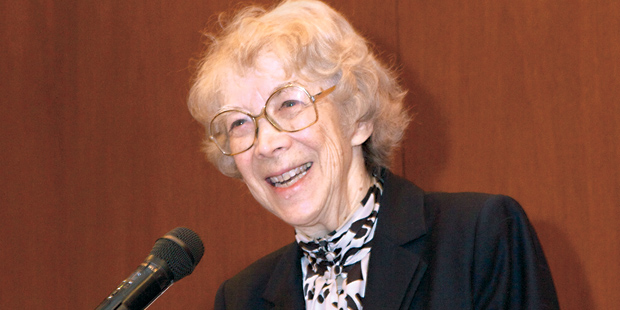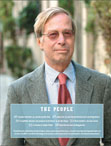Rosie the Riveter, with a Bunsen Burner
Coming of age during World War II, Pauline Newman ’58 brought a can-do spirit to careers in science and the law.
Printer Friendly VersionThe phrase “the first woman to…” occurs frequently in descriptions of Judge Pauline Newman’s career. She was the first woman to be appointed an appellate judge by President Reagan. She was the first woman to be elected as an officer or director of a large number of scientific and law associations, and to hold various research and management positions in industry.
Yet Newman, the NYU Law Women 2013 Alumna of the Year, sees herself less as a pioneer than a product of her time. Born in 1927, she graduated from college two years after World War II. “During that era of total mobilization, women moved into every traditional male job: Rosie the Riveter posters recruited women into heavy industry, women ferried bombers overseas, women fought fires and patrolled the streets,” she recalls. “As a young woman, I was very much aware that women could do anything.”
Even so, the glass ceiling was still low enough to practically touch the floor. As a result, her career path, while “extraordinarily satisfying,” as she notes, was also “not quite straightforward.”
Newman’s initial plan after graduating from Vassar College in 1947 was to become a doctor. But after 12 medical schools turned her down, she switched her sights and got an MA in pure science from Columbia University and a PhD in chemistry from Yale University. She turned to industrial research with the American Cyanamid Company, but she confessed her wanderlust to the Law Women, and as soon as she had saved enough money she bought a ticket to Paris on the SS Ile de France. She stayed there for six months, funding her sojourn by tending bar in a boîte on the Ile Saint-Louis. Newman boasts that to this day she can serve up any mixed drink—as long as it’s ordered in French.
Upon her return to New York, she was offered a job “no respectable scientist would take”—writing patent applications at FMC Corporation—“but since I was getting quite hungry, I took it.” To her surprise, “it wasn’t quite as dreary as I expected.” Her commute took her past the NYU Law campus, and she often stopped in at a bar favored by law students, eavesdropping, she confesses, on “all the fascinating conversations about torts.” Soon she was a student herself, attending classes at night while working at FMC during the day. “It turned out that I liked the law, very much,” Newman says. “The law summoned the same parts of my mind that had attracted me to science, years before.”
Her scientific background continued to shape Newman’s career, and in 1961-62 she served as a science policy specialist in the Department of Natural Sciences at UNESCO. Back at FMC, in 1969 she became director of the patent, trademark, and licensing department, and continued to serve a host of legal and scientific organizations. “It undoubtedly eased the next step in my career,” she notes, “because so many people knew me.”
That step was the US Court of Appeals for the Federal Circuit. It was 1984, a time when the fruit orchards south of San Francisco were being transformed into Silicon Valley. Newman was in the right place at the right time and with the right credentials. “The same postwar era that has opened so many opportunities for women has seen extraordinary technological advances, much of which has flowed from entrepreneurship—which is the focus of patent law,” she says. “The patent system provides the only incentive to commercial investment that comes not from government subsidy but from privately supported ingenuity, investment, and competition. The court on which I am privileged to sit has been, for the past 30 years, at the core of advancing and adapting that law to the nation’s purpose.”
In her 29 years as a judge, Newman has helped guide the growth of the technology industry, which now accounts for between 60 percent and 78 percent of the US economy—“depending on how much weight you put on the intellectual property component,” she notes.
Despite her career’s uncertain beginnings, Newman can look back on a professional life rich in recognition. At NYU she endowed the Pauline Newman Professorship of Law, now held by Rochelle Dreyfuss, as well as the Pauline Newman Intellectual Property Fellowship to encourage young academics to develop an interest in patent law. In 2001, she was awarded the Vanderbilt Medal, NYU Law’s highest alumni honor.
To women thinking of entering the legal profession, she says, “I well understand that there remain many gaps to be filled, but from the perspective of the changes I have observed during my lifetime, I am optimistic for the future.” She advises, “Keep your options open, your mind open, and see what opportunities turn up. And if you have the irresistible urge to dump everything and go to Paris, I would urge you to do that, too. But I can promise you that in the law, the future will delight you. It certainly has delighted me.”
—

